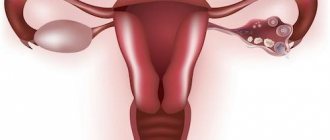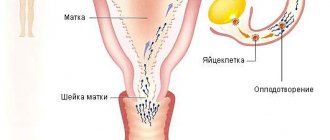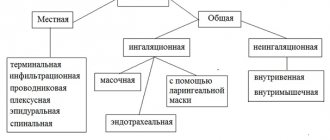What is IVF, in what cases is it prescribed?
In vitro fertilization allows women who cannot get pregnant naturally to give birth to their first child, or second or third child.
The procedure is complex, it is carried out strictly if there are indications - certain forms of physiological male and female infertility, if the reason for the lack of conception could not be identified.
The diagnosis of infertility is made if parents are under 35 years old and cannot conceive a child within a year with regular sexual activity.
The main indications for IVF are obstruction or absence of the fallopian tubes, endometriosis, serious hormonal disorders that could not be eliminated with drug therapy, defective ovarian function, and low sperm quality.
Contraindications – congenital pathologies of the uterus, fibroids and other malignant and benign neoplasms, any acute inflammatory processes, mental disorders.
IVF stages:
- ovarian stimulation - using hormonal drugs;
- egg puncture, sperm collection;
- artificial fertilization of an egg;
- growing the embryo in vitro for 1-5 days;
- embryo transfer into the uterine cavity.
All these steps do not seem so difficult, but most often it is difficult for women mentally and physically to endure the preparation and procedure of embryo transfer itself.
Do not forget about the cost of IVF - the average price is 1200-5000 thousand dollars, depending on the type of protocol, types of preliminary diagnostics, necessary medications, and the level of the clinic.
If pregnancy does not occur for a long time with regular sexual activity, couples are prescribed a comprehensive examination, since the reasons can be not only physiological, but also somatic and psychological.
Therefore, before thinking about IVF, you need to identify and eliminate possible causes that prevent conception - more than 50% of couples who do not have children do not need in vitro fertilization.
Do not rush to take a pregnancy test the day after IVF, as with natural fertilization, the coveted 2 stripes can be seen only 10-14 days after conception.
Whatever the result of the home test, be sure to donate blood for hCG levels - the level of this hormone always increases after pregnancy.
How to recover from a failed IVF attempt
There is great hope placed on every protocol. After all, this procedure requires considerable financial and moral investments. Every couple hopes that this time everything will work out. The two weeks of waiting for the coveted two lines on the test pass slowly and with great excitement. And what a blow failure is. For many, the sensation is comparable to falling into a bottomless abyss.
The important thing here is not to lose hope and keep trying. As you know, it is possible to make another protocol only at least six months later. All this time you need to rehabilitate your moral and physical strength.
And here is more information about ovarian hyperstimulation syndrome.
We restore health
First of all, you need to find out the reason for the failure and take the necessary tests. Most often, only after failure with the first attempt does it become clear what exactly is the cause of infertility. Together with your doctor, you need to develop a treatment and recovery plan, as well as a repeat protocol.
In addition, you need to give the body a rest after hormonal support and drug stimulation. But here comes trouble. Once support is withdrawn, the menstrual cycle is disrupted and may take several months to recover. Therefore, it is worth consulting with a gynecologist which medications will help in this case.
For many, problems with the gastrointestinal tract worsen or begin, since the woman had to swallow a huge amount of medicine. They often arise due to constant nerves and stress. It is also important to visit a specialist if you have unpleasant and strange sensations; a diet may not hurt.
In addition, kidney problems often occur due to stress, hormone therapy and a large number of medications. You shouldn’t drink diuretics heavily, but you also shouldn’t reduce the amount of fluid you consume. It is better to limit yourself to natural remedies.
Restoring moral strength
In addition to health problems, many women and men experience loss of energy, changes in mood, depression and apathy. Under no circumstances should they be allowed to develop. You must understand that IVF is just a chance, but not a 100% solution to the problem. There is no need to fall into despair. It is extremely important to start doing something, find a new hobby, and get your appearance in order.
To avoid gaining excess weight due to stress and depression, which can then become a problem the second time you try, you should go in for sports. Any physical activity is suitable - from morning walks in the park to training in the gym. The main thing is to do it with pleasure.
Failed IVF - consequences
For many women, in vitro fertilization is the only chance to become a mother, and when 2 weeks after IVF the test results are negative, severe depressive states often develop, and consultation and support from a psychologist is often required.
Miscarriage
As with natural pregnancy, miscarriages often occur after IVF; this happens before 10-12 weeks. Spontaneous abortion occurs against the background of the development of genetic abnormalities, exacerbation of chronic diseases, hormonal imbalances, stress, and missed abortion syndrome.
To save a child, a woman sometimes has to be kept for all 9 months, but then she can immediately give birth to not one, but two or three babies at once - with artificial insemination, the probability of a multiple pregnancy is quite high.
Signs of a miscarriage are nagging pain in the lower abdomen, lumbar region, spotting, fever, chills, severe weakness, frequent bouts of dizziness. If you experience at least one of these symptoms after the transplant, immediately call your doctor or call an ambulance.
Health problems
A series of unsuccessful IVF attempts is fraught not only with psycho-emotional disorders, but also with the development of other negative consequences:
- disturbances in the functioning of the digestive system;
- rapid weight gain;
- severe renal and hepatic pathologies;
- exacerbation of old or development of new reproductive and gynecological diseases;
- hormonal imbalances, active hair growth on the face, arms, legs, disruptions in the menstrual cycle, diseases of the mammary glands, early menopause;
- endocrine diseases;
- With each new attempt, the risk of developing ovarian cancer in the future increases.
How to recover psychologically and physically after unsuccessful IVF
Initially after a failed reproductive procedure, it is vital to take care of yourself. Replenish your strength, put your emotional state in order. Until this happens, you shouldn’t even think about getting pregnant on your own. Even if the wish comes true, your exhausted body will not be able to bear the baby, which will further shake your faith in yourself. Therefore, first of all, take care of your body.
Recovery will begin with an examination. The patient should visit a gynecologist and undergo tests that will help determine the cause of the failure. Often it is at this stage that the true cause of infertility is discovered. After a significant dose of hormonal drugs and stimulation of superovulation, the patient may experience menstrual irregularities. Its recovery will take from one month to six months. The condition of the digestive tract cannot be overlooked, because taking a large number of medications disrupts the functioning of the stomach and intestines. This, in turn, will start the process of weakening immunity.
Simultaneously with restoring health after a failed protocol, you need to normalize your emotional state. The news of failure can dampen the morale of both spouses, but one must not give up. A second IVF attempt will be allowed no earlier than six months later. During this period, you need to take a break: take care of yourself, relax and, if possible, change your surroundings or go on vacation.
To avoid getting depressed and getting hooked on sweets that lead to excess weight, you can go in for sports. Physical activity relaxes the body and distracts from negative thoughts.
Even if you have never consulted psychologists or psychotherapists, now is the perfect time to start. A specialist will help you understand yourself, your emotions and experience them correctly. You will definitely find the strength to live on and continue to fight for future children.
Even though trying to get pregnant failed, you can't blame your partner. On the contrary, failure should unite the couple in order to jointly cope with the circumstances that have arisen.
Chances of getting pregnant after IVF
Medicine does not stand still, but even in the most modern IVF centers the probability of becoming pregnant after artificial insemination is no more than 37%, in foreign clinics this figure is higher - approximately 56%., but the cost of the procedure differs from our prices several times, upward , naturally.
The greatest chances of successful conception after embryo transfer are for young couples, provided that infertility is caused solely by hormonal problems - pregnancy occurs in 70% of cases.
Doctors prescribe a repeat IVF procedure after 3-6 months, less often after the end of the second menstruation; all this time the woman needs to restore her moral and physical strength.
After an unsuccessful protocol, you should re-take all the necessary tests, do an ultrasound - often only after the first attempt it is possible to identify the true reason for the lack of natural conception.
How to recover from a failed IVF attempt?
If after IVF the long-awaited pregnancy does not occur, then there is a fear of a repeat procedure (the possibility of failure). In this case, you should begin to rehabilitate your physical and moral health.
About 70% of success depends on proper preparation for the next attempt.
Before your next attempt, it is recommended to check:
- kidneys;
- cardiovascular system;
- gastrointestinal tract.
Is it possible to get pregnant naturally after IVF?
In some forms of infertility, the chance of becoming pregnant naturally after an in vitro fertilization protocol increases. At the preparatory stage, the ovaries are actively stimulated, this effect persists for a long time.
Pregnancy after IVF - how to increase your chances of conceiving:
- positive emotional background, lack of stress;
- proper and balanced nutrition;
- moderate regular physical activity;
- adherence to daily routine;
- strengthening the immune system.
Every couple needs to learn that IVF is only a chance to give birth to a long-awaited child, but not a guaranteed solution to the problem.
Positive effects of preparation for IVF
Before IVF, a couple undergoes a large number of studies, the purpose of which is to identify the cause of infertility and choose the optimal method of treating it. In some cases, patients receive preliminary therapy with hormonal drugs or antibiotics (if infections are detected). Sometimes, as part of the preparation, surgery is performed to excise scars, adhesions, polypous growths or myomatous nodes.
Hidden infections, including viral ones, are detected. In addition to the ability to provoke low-grade inflammation and the formation of scars and adhesions, these infections can also affect fertility, implantation or gestation. Treatment of these diseases before IVF also increases the chances that the couple will be able to conceive a child naturally on their own.
Why does natural pregnancy occur after IVF?
According to statistics, approximately every fourth woman managed to become pregnant on her own after unsuccessful IVF; the chances for natural conception are especially high in the first 4-6 weeks after the protocol.
In 15% of women, a second pregnancy occurs within 1-2 years after the birth of a “test tube baby”.
Reasons for spontaneous conception after IVF:
- couples diagnosed with infertility stop using contraception, which often leads to a primary or repeat pregnancy after IVF;
- intensive hormonal support - throughout the entire preparatory stage, the woman takes many medications that stimulate fertile functions in the body;
- all preliminary preparation is aimed at setting the body up for conception and gestation, the effect persists for another 1–2 years even after unsuccessful IVF;
- couples who are ready for in vitro fertilization radically change their lifestyle - they follow a daily routine, eat right, lead an active lifestyle, give up addictions, all this has a positive effect on the functioning of the reproductive system and the entire body as a whole.
When a woman has her first child, even after artificial insemination, her psycho-emotional state significantly improves, and the feeling of inferiority disappears - these factors often interfere with effective infertility treatment.
When male infertility is diagnosed, the absence or complete obstruction of the fallopian tubes, or some forms of uterine hypoplasia, conception naturally after IVF is simply impossible; giving birth to a baby is possible only after successful artificial insemination.
Who has a chance of conceiving naturally after IVF?
For all questions related to IVF, call:
+7
According to statistics collected in recent years in a dozen different countries, about 17% of couples can become pregnant on their own after IVF, which was performed earlier and resulted in childbirth. Partners who have been diagnosed with infertility of unknown origin have the greatest chance of spontaneous conception. In such cases, there are no obvious physiological or hormonal disorders in the woman, the man’s sperm are recognized as high quality, but pregnancy still did not occur before IVF.
The likelihood of pregnancy on your own without IVF
The possibility of pregnancy in the future without IVF remains the same as before the procedure. The chances of conception are more likely to increase. An organism that has undergone preparation for IVF, even after an unsuccessful protocol, remains “in the stimulus” set during preparation for the procedure. There are many cases where, after an unsuccessful protocol, and sometimes after several failures, patients became pregnant naturally.
A team of scientists from France calculated the proportion of “spontaneous” conceptions in patients who underwent IVF: about 24% of French women who underwent unsuccessful in vitro fertilization subsequently gave birth to babies without resorting to this procedure. The proportion of women who became pregnant naturally after successful IVF was approximately 17%.
Pregnancy with IVF: if a woman is soon 40
Assisted reproductive technologies (ART), which includes the IVF method, are often the last chance for a family that wants a child, but pregnancy does not occur naturally. Methods of combating female and male infertility are constantly being improved, and the age limits of patients in need of an IVF program are gradually expanding. What should women approaching 40 expect? Svetlana Aleksandrovna Zvereva, an obstetrician-gynecologist at the Moscow clinic “Medicine,” told us about this.
Svetlana Aleksandrovna, which patients do you have the most of right now?
Women of late reproductive age, as we call it, are patients who are about 40 years old. Perhaps this is a kind of sign of the times: women at 40 still feel young and strong enough to give birth to a common child in a new marriage or to experience the joy of motherhood once again, having already raised older children and achieved a lot in their careers. Now we have the majority of them. Many have a complex medical history, long-term treatment and even several attempts at IVF.
I will add that men also contribute. Very often, a couple who comes for an initial appointment has problems on the male side too.
If you are diagnosed with infertility or pregnancy simply does not occur, what do you advise to do?
If a woman is unable to get pregnant within 9-12 months, it is important to find a gynecologist-reproductologist, under his guidance, undergo all the necessary examinations and, if necessary, choose a treatment tactic. A few months are enough for this. If within 2-3 months it turns out that there is very little chance of a natural pregnancy, you should not delay treatment - you need to tune in to assisted reproduction. After all, it still happens that women are treated for years using outdated methods and waste precious time.
If a woman is over 35 years old, these periods are further shortened. If pregnancy does not occur within six months, you should make an appointment with a fertility specialist. The fact is that after the age of 37, our fertility declines, the ovarian reserve (the number of eggs that can be used for fertilization) is depleted, and the chances of pregnancy, even with the help of assisted reproduction, decrease sharply. After 40 years the chances are even less. The most valuable thing a woman has is age: the younger we are, the higher our fertility.
How to choose a clinic for infertility treatment and IVF? Can you name some criteria?
The most important criteria are reviews from other people. Nothing can replace word of mouth. If a person liked the way he was treated, and he got the result, carried and gave birth to a healthy child, he will recommend this particular clinic to everyone around him.
The psychological factor is of great importance. When people have to sit in line, appointments are not respected, and the doctor cannot devote enough time to the patient, no one likes it.
In your opinion, on what basis does a patient choose a doctor?
Everything is very individual. Someone should have personal sympathy, for someone reviews or track record are more important. The effectiveness is assessed - the percentage of successful pregnancies with a particular doctor. For some, the location of the clinic is convenient—close to work, for example.
Most often, at the selection stage, people go to different clinics for an initial appointment. Counting on serious treatment and IVF, they are looking for their own doctor - someone who they will like and who will inspire trust.
We recently had a patient undergo an IVF program, a general practitioner herself, she is 40 years old. Before contacting us, she had already had 3 IVF attempts. I remembered her - she came to an appointment about a year ago. And when we already started the program, she said that for a year she walked all over Moscow, was in a variety of places offering IVF. All this to decide on the 4th program in your life.
How does the IVF program work?
The preparatory stage includes examination of the patient. This gives some guarantee that everything will be fine during the work process.
The IVF program itself consists of four stages. The first includes stimulation of superovulation: the patient is injected with gonadotropic hormones, due to which not one, but several follicles grow in the ovaries.
At the second stage, the eggs are punctured: under ultrasound control, with a thin needle through the vaginal vault, we collect the eggs and transfer them to the embryology laboratory. On the same day that the eggs are collected, the patient's husband donates sperm.
Next comes the third, embryological stage: fertilization using IVF or ICSI. With IVF, sperm independently fertilize oocytes, as in natural life. With ICSI, fertilization occurs through the injection of sperm into the oocyte. The latter method is more often used when the male factor of infertility is pronounced, when there are few fertile sperm, their activity and mobility are reduced.
Formed embryos usually live in incubators for 2 to 5 days. At the fourth stage, the issue of transferring embryos into the uterine cavity is decided. The remaining good quality embryos are cryopreserved for subsequent attempts.
The woman then receives hormonal support for two weeks. 12-14 days after the transfer, blood is donated for hCG - this test confirms pregnancy. If pregnancy has taken place, then until 8 obstetric weeks we continue to care for the patient and solve all possible problems that arise in the early stages. Then we transfer it to obstetricians for further management of the pregnancy.
What is the current effectiveness of the IVF method?
At the moment, our average number of developing pregnancies is 48%. This is for all age groups. If we talk about the older age category, then it is important whether we work with our own cells or with donor ones. The chances of getting pregnant with your own cells for a woman over 40 years old are about 10-20%. If we use donor cells in older patients, we get very high results - up to 60-65%.
We want IVF programs to be 100% effective and pregnancy to occur immediately. But statistics are a stubborn thing - there is no 100% IVF anywhere, just as there are no 100% pregnancies in natural life. The chance of getting a child is always about 30-40%, apparently, this is how the human body works. Agree: healthy people in terms of reproduction, having regular sex life, still do not get pregnant every month. A lot of losses occur in the early stages, even before implantation of the fertilized egg. We call them “biochemical pregnancies,” but in natural life they are not noticed by anyone and are not recorded at all.
Do pregnancies often fail during the first 8 weeks?
Yes, there are losses. Up to 20 percent in total. At this stage, losses of ordinary pregnancies also occur. And after IVF, given age and medical history, this happens more often.
Why is pregnancy terminated before 8 weeks? This means that nature worked correctly: there were some breakdowns in the cells, and it was impossible to endure such a pregnancy. There are other reasons, but most often they are genetic, and in this case we cannot save this pregnancy in any way. Natural selection works even in such an artificial, science-intensive process as IVF. Our pregnancy rate is 48-49%, and birth rate is 32%.
Previously, in such cases the word “miscarriage” was more often heard, now it is “frozen pregnancy.” Why?
Previously, women were not examined so often by ultrasound, and it was not known when the pregnancy stopped developing - it was only visible when it began to be interrupted. The woman walked and did not know that the pregnancy was not developing until bleeding began. And today on an ultrasound we can see that there is no heartbeat.
How can a woman take care of herself during this important period - the first weeks?
First of all, after the embryo transfer, the woman receives sick leave. We are trying to convey to our patients: the state gives you the right to stay at home for these two weeks. Do not travel in public transport, do not risk catching some kind of viral infection, do not run around with bags, do not be exposed to stress at work.
It is not necessary to lie down during this period - you need to lead a calm lifestyle. Stay at home, read books, watch good films, sleep, walk. So that at this moment there is only positivity.
Is pregnancy management after IVF different from normal pregnancy management?
Mainly in the early stages - due to stimulation of the ovaries and hormonal support after the transfer: you need to leave it on time and carefully. Then, if everything is fine, then this is a normal pregnancy. Concomitant diseases can complicate the course, usually in older patients. A significant proportion of pregnancies are multiple, so the problem of miscarriage is not that uncommon.
After IVF, do they usually give birth by caesarean section?
Now it is no longer possible to say so clearly. Pregnancies after IVF are no longer rare, and obstetricians began to treat them more adequately. There are more independent births. If the pregnancy is progressing normally, a natural birth is possible. Even among women of late reproductive age there are those who give birth themselves. Especially if childbirth has already happened in their life.
And sometimes they give birth to twins themselves. If the children are not very large, are located conveniently, labor is in order - why not? But the first child, closer to 40, will probably most likely have a caesarean section - simply because of the bunch of problems that have accumulated, as a rule, by this age. And if a woman after IVF is inclined to have a cesarean section, she is unlikely to be prevented from doing so.
Of course, the obstetrician decides - everything depends on his professionalism, intuition, and responsibility.
Do you give any lifestyle recommendations to those preparing for IVF?
We have a special reminder, and when a woman comes for her initial appointment, she receives a list of examinations and necessary documents, as well as recommendations on nutrition, taking vitamins, lifestyle in the preparatory stage and in the early stages of pregnancy.
There are three points that I usually focus on.
Firstly, we strongly do not advise women in programs to fly - this is stressful, pressure changes, harmful radiation.
Secondly, we ask you to limit smoking, the dangers of which are known to everyone.
And the third problem is excess weight. In overweight women, it is more difficult to obtain cells, even technically. And the response to stimulation is unpredictable, because metabolic disorders affect the entire body. And there can be problems with ovulation, and with the onset of pregnancy, and with gestation. And if pregnancy occurs, the likelihood of complications is also higher.
Are reproductive doctors and IVF doctors specially trained to communicate with patients? Are there any programs or trainings?
No, in this regard we are not taught anything - everything is learned only from our own experience. When you work for many years and see these unfortunate people who, firstly, have infertility, and secondly, unsuccessful IVF, then somehow you yourself try to be a psychologist and psychotherapist for them. Sometimes the appointments are not gynecological - especially after failures: the woman and I just sit and talk for that hour.
Believe me, we also take failures very hard. We both professionally want to be successful, and humanly we want to help every woman.
Interviewed by Irina Sukhovey
Several failed protocols: consequences
Naturally, a woman who has gone through an unsuccessful IVF protocol and who pinned her cherished hopes on it is in a state of frustration when her hands give up and the whole world seems meaningless. It’s hard to even guess what kind of feelings you’ll experience after the second or subsequent unsuccessful attempts.
The situation is aggravated by the fact that the break for carrying out a new procedure after an unsuccessful protocol is at least six months. Unfortunately, depression in this situation is almost inevitable. Therefore, it is necessary to use courage, and perhaps the support of a psychologist, in order to successfully cope with it.
In addition to the impact on the psychological state, several unsuccessful protocols in a row can also lead to problems with the digestive system, kidneys, liver, and new (or worsened) problems of the female reproductive system. This is due to the abundant medicinal support of the body during preparation and completion of the procedure, as well as a high level of stress.
Natural conception after unsuccessful in vitro fertilization
After unsuccessful IVF, the body’s ability to conceive naturally also increases. This is especially true in the first month after an unsuccessful procedure. Since the parents were prepared for the protocol: they followed the regime, received medication and hormonal support for the body - all this is a favorable background for the onset of a “spontaneous” pregnancy.
Sometimes psychological factors interfere with pregnancy. There are no contraindications to conception due to health reasons, but a woman cannot become pregnant. This may be due to excessive experiences and reflection on this topic. On the other hand, the woman herself is not psychologically ready for the birth of a child and has hidden anxieties. In these cases, not medical, but psychological help is required.
In vitro fertilization is a real opportunity to become parents when the situation seems hopeless.
However, it should be remembered that this is not a magical panacea, but a serious medical procedure. First, it requires responsible preparation on the part of parents. Secondly, there is no need to be afraid of failure.
According to statistics, only a third of the protocols end in pregnancy. That is, if for one woman pregnancy occurs from the first procedure, then for another it can happen only after the third, fifth or even tenth attempt. The chances of a natural pregnancy do not disappear, so it is necessary to include all possible options, because a real miracle is at stake - a new life.










